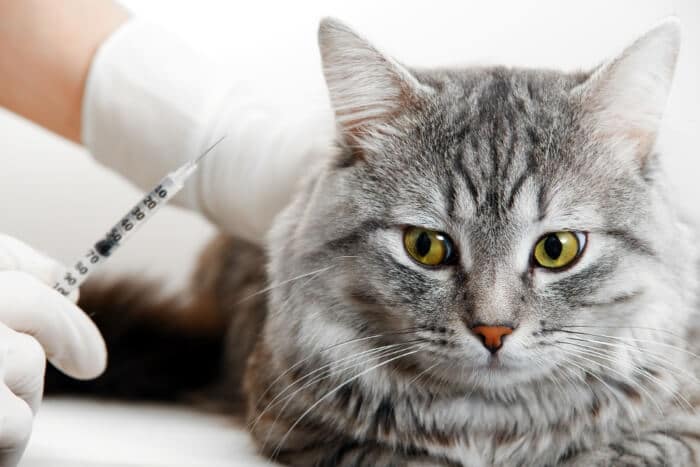
As a vet writing in the media, I try to stay away from writing about prescription only products: these, by definition, can only be given after a vet has decided that they are clinically indicated.
Convenia for Cats Overview

If cat carers read about prescription only products and then feel motivated to ask their vet to use them for their pets, this carries the risk of placing undue pressure on vets. So I need to be clear at the start of this article: it is for a veterinarian to decide to use prescription products, not an owner.
That said, my mission in life is to communicate veterinary science to animal carers. I believe that if a drug is given to an animal, prescription or otherwise, it can only be helpful for an owner to understand more about the drug. The more information people have, the more likely they are to be able to help their pets with the help of their veterinarians.
With this proviso, this article is about a widely used product in feline medicine, an antibiotic called cefovecin, known more commonly by its brand name, “Convenia”.
What Is Convenia
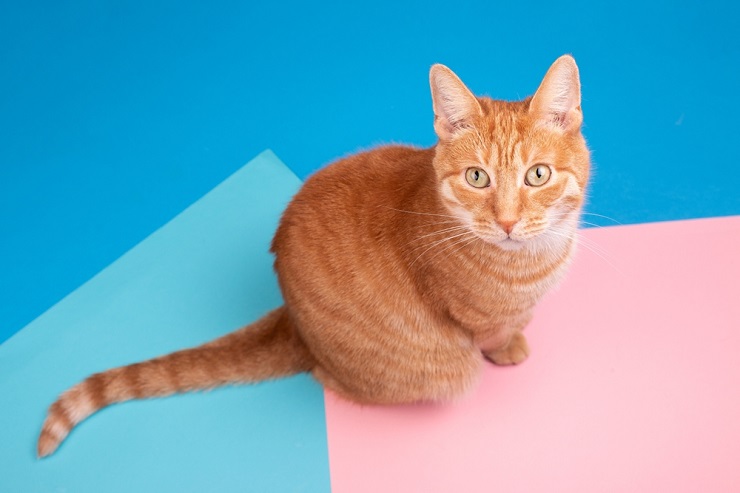
Convenia is a widely used third generation cephalosporin antibiotic marketed by the largest multinational animal health company in the world, Zoetis (formerly Pfizer).
Convenia is an injectable antibiotic with a unique formulation which means that one injection lasts for a full two weeks (most injectable antibiotics are only effective for 24 hours).
It’s this aspect that gives the product such a talking point and a high profile; so many owners have difficulty giving medication to their cats, and it’s a significant benefit to be able to give the equivalent of two weeks of twice daily tablets in a single injection.
What Is a Third Generation Cephalosporin Antibiotic?

Antibiotics, by definition, kill or inhibit the growth of microorganisms including bacteria. Cephalosporins are a particular group of antibiotics: they are bactericidal (i.e. they kill bacteria rather than just inhibiting their growth), and they are known as beta-lactam antibiotics because they contain a beta-lactam ring in their molecular structure. They kill bacteria by inhibiting enzymes in the cell wall of susceptible bacteria.
There are five generations of cephalosporins, with each generation having different properties to the previous one. This is a similar concept to the different iteration of iPhones: the original iPhone was first generation, and the latest model – the iPhone 11 – is the eleventh generation.
What Is Convenia Used for in Cats?

Convenia should only be used in situations where cats require a full fourteen day course of antibiotics, and in particular Convenia is useful in situations where it is difficult or impossible to give a cat normal oral antibiotics (such as tablets).
Convenia is most commonly used for the prolonged treatment of skin and soft tissue infections, for infections of the urinary tract, and as part of the management of severe periodontal disease. It generally has good efficacy against the bacteria commonly associated with these conditions.
Vets may sometimes give owners a choice between a course of antibiotic tablets (which may be less expensive, but which may be less easily administered) or a single injection of Convenia.
The drug is not as highly effective as some other antibiotics against some bacteria (e.g. Pseudomonas) so it is a decision for the vet as to whether or not Convenia is an appropriate choice for a particular case.
What Dose of Convenia Is Given to Cats?
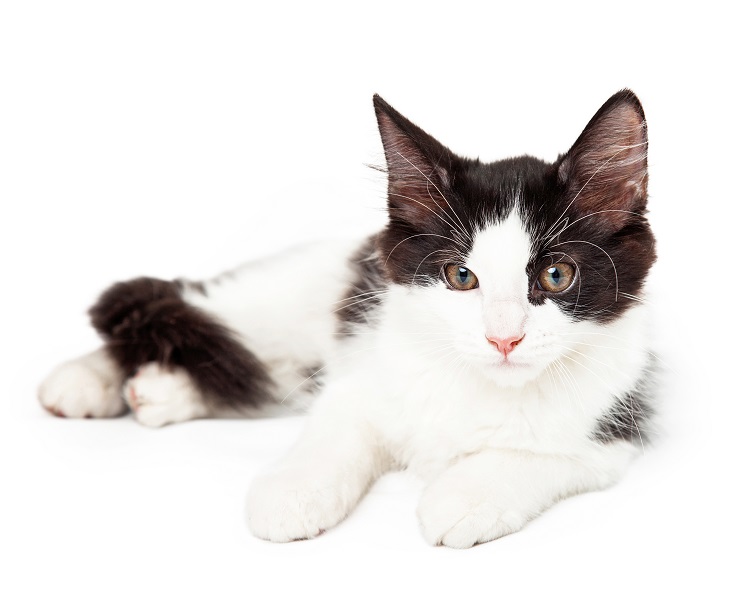
Convenia is sold to vets as a powder inside a sterile bottle: this is made up into a solution by the addition of a reconstituting solution. This needs to be kept in the fridge, and should be used within 28 days. The dose per cat is weight-related, at a rate of 0.1ml per kg, injected sub-cutaneously, usually into the scruff of the neck. Some cats (e.g. patients with renal failure) may require a lower dose: this is a judgement for the prescribing veterinarian to make.
Dosing Table for Convenia
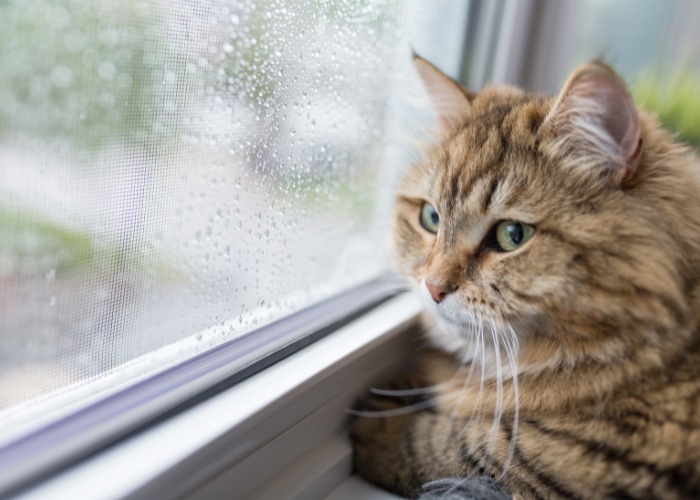
| Animal Weight | Volume To Be Administered |
| 2kg | 0.2ml |
| 2.5kg | 0.25ml |
| 3kg | 0.3ml |
| 3.5kg | 0.35ml |
| 4kg | 0.4ml |
| 4.5kg | 0.45ml |
| 5kg | 0.5ml |
| 5.5kg | 0.55ml |
| 6kg | 0.6ml |
| 6.5kg | 0.65ml |
| 7kg | 0.7ml |
How Long Does Convenia Take To Work in Cats?
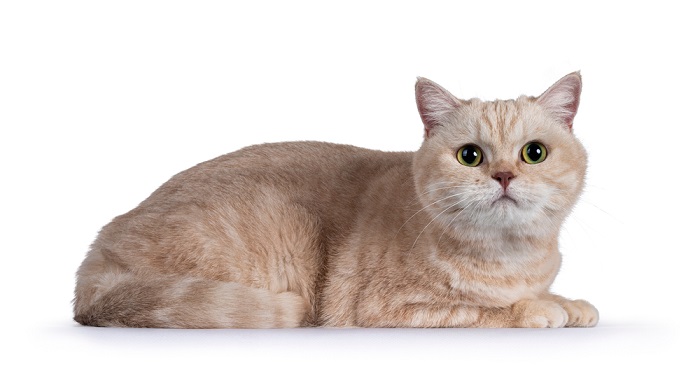
The antibiotic is normally absorbed into the circulation from the injection site within two hours, producing high levels in the blood stream which last for two weeks.
This long lasting effect is made possible because of high levels of binding of the drug to proteins in the blood stream which prevent it from being rapidly metabolised and excreted in the same way as most injectable antibiotic preparations.
Does Convenia Have Any Side Effects in Cats?
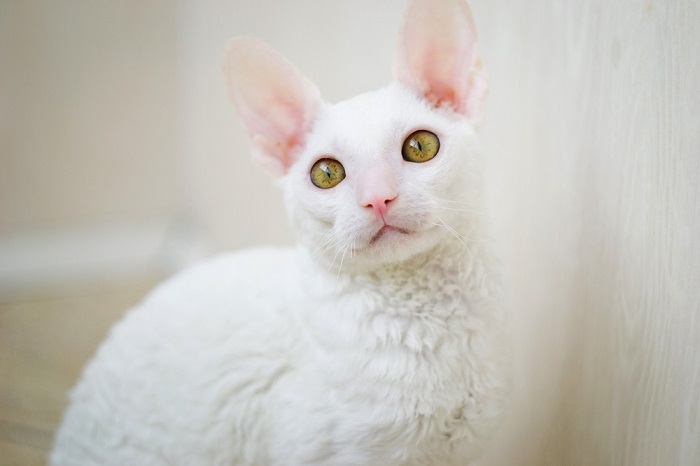
Most cats show no side effects after treatment with Convenia, but nearly all medications have a long list of possible side effects, and Convenia is no different. This is one of the reasons why many medicines are prescription-only: vets need to weigh the appropriateness of a product for a particular patient, taking many factors into account, including potential side effects for certain individual animals.
So-called hypersensitivity reactions (such as allergies or auto-immune problems) to Convenia can occur but they are rare. Occasionally, blood cell abnormalities may be seen following high doses.
In cats, other side effects of Convenia that are rarely seen include vomiting, diarrhoea, anorexia, lethargy, hyperactivity, inappropriate urination and mild elevations of liver and kidney enzymes (the liver metabolises Convenia, while the kidneys excrete its by-products in the urine).
Other very rarely recorded side effects include salivation, itchiness, injection site reactions, swelling of the face, ataxia (unsteadiness), tremors, seizures, and exceptionally rarely, death.
It’s easy to worry excessively when reading a list of potential side effects like this, but it should be stressed that Convenia has been very widely used for over a decade, and has a long established record of complete safety in the very high majority of cases. Studies have shown that even when dose rates of over seven times normal have been given, the drug has been well tolerated by cats.
How Much Does Convenia Cost?
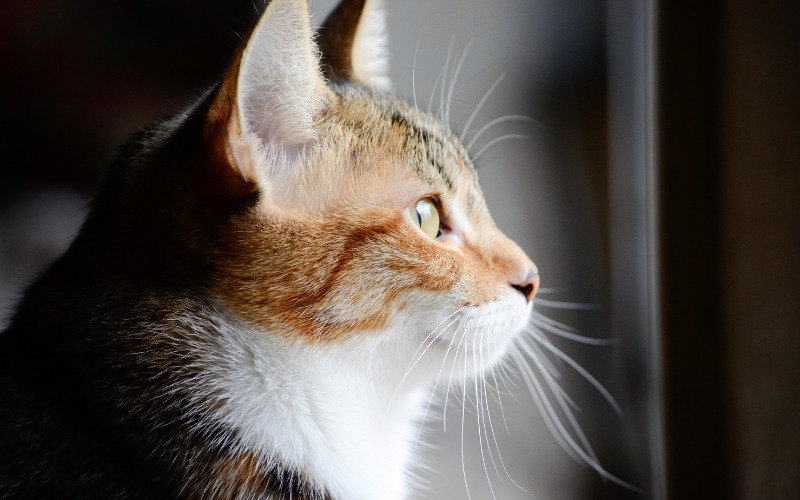
Convenia is given as a prescription only medicine by vets, so the supply chain comprises manufacturer to wholesaler to veterinary clinic.
The price paid for Convenia by pet carers depends on the pricing structure operated by each of these three entities, and varies from location to location. If you are concerned about the cost of Convenia, you should ask your vet for an estimate before the injection is administered.
In general, Convenia is likely to be more expensive than an equivalent course of antibiotic tablets: it would be expected that a premium of some type would be payable for the convenience of not having to give twice daily tablets for two weeks to an unwilling cat.
| Cost Of Convenia – Explanation Using Fictional Sums As Example | ||
| Manufacturer | Wholesaler | Vet |
| $10.00 | 30% mark up means $13.00 | 30% mark up means $16.90 |
Is Convenia Suitable for All Cats?
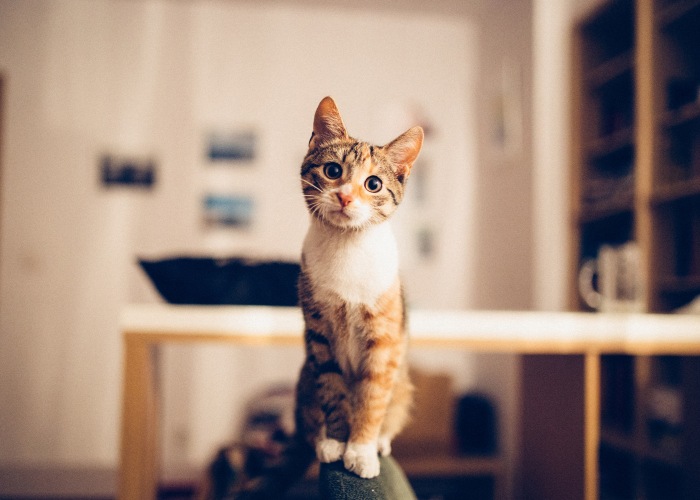
Convenia is widely used across the cat population, with a few provisos.
- First, it is not normally recommended in kittens less than 8 weeks of age.
- Second, safety has not been proven in pregnant or lactating cats.
- Third, a reduced dose should be given if cats with renal failure are being treated.
- Fourth, and obviously, it should not be given to cats with known hypersensitivity to β–lactam antibiotics.
- Convenia is safe for older cats, but as stated previously, this decision is for a vet to make rather than the owner.
Are There Any Other Nuggets of Important Information About Convenia?
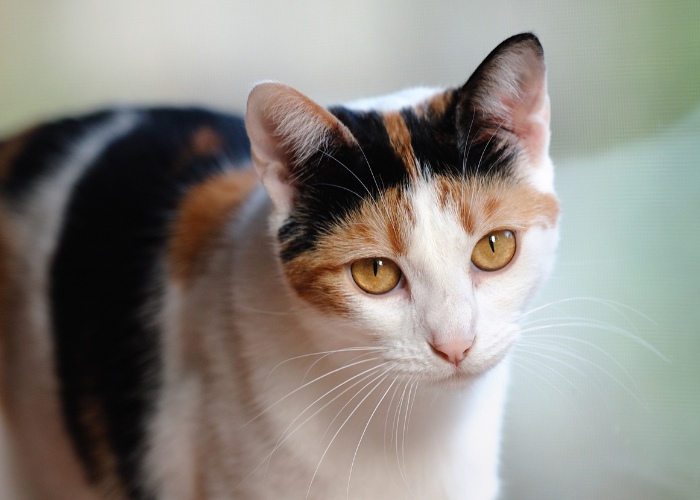
The veterinary community welcomed Convenia when it was launched in 2007: it won an “Easy To Give” award from the iCatCare website.
Convenia continues to be widely used and appreciated by feline veterinarians, helping to ensure a high level of compliance with courses of antibiotics (owners may not give a full course of tablets due to difficulties with giving their pets tablets: this is not an issue with Convenia).
Convenia is not a panacea, and should only be used after careful consideration by veterinarians, but it’s an exceptionally useful formulation that has significantly improved the veterinary profession’s antibiotic armoury for feline patients.



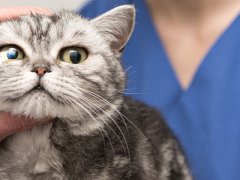




I have concerns about my cat who was given Convenia injection on Thursday and I had to have her put to sleep on Friday night. She went into cardiac arrest which made it difficult for her to breath. She had not had these problems until she received this injection. After reading some of these reviews I can’t help but believe that this injection caused my cat’s death. She was 15 years old, would be 16 in August, had lived a good life and now is gone. She was given this along with a steroid injection vetalog. I pray that if this is what caused her death that those who are responsible will pay.
I become a cat lover about a year ago after my grandson brought home this little baby kitty! We thought it was a boy and name him Toast Master. Well 8months into it we found out he was a she and we had kitties and change her name to Toastie . Now we have 7 kitties we have been a very happy little family till our Patches started sneezing and coughing and I was scared to death to see so much discharge come from her nose So I took her to the vet They gave her a shot of Convenia I have been reading up about the sneezing and discharge and the Convenia What I have read really concerne me because I haven’t found anything yet that says that the injection of Convenia is used for a cold and I wasn’t told by the vet how Patches could pass this on to everyone else and now I have 7 kitties sneezing and coughing and lots of discharge Everyone is now sick and seam to be suffering I have no idea how to help them and I feel horrible Am mad as hell at vet for not informing me how fast this cold could spread among my babies. Patches is not getting better and I have spent a lot of money and I am scared that the Convenia might hurt her and if I take everyone else to the vet they will just give them the same thing. Is the injection of Convenia What my kitties need is it going to make them well and feel better?? I don’t know what to do I don’t know how to help them
My cat also took a 14 days convenia injection last Tuesday and on Wednesday was put to sleep, she suffered throughout the night with bad reaction which caused pulmonary edema, I took her in because she had toothache and was supposed to have the tooth extracted, her blood test came all clear and she was fit for the surgery, she had no other health problem, I’m heartbroken and the next day I took her in, the vet took a xray and said she had fluid in her lungs and claimed she always had that, he will never admit it was because of the convenia, the primary and fatal side effect of convenia is pulmonary edema, I feel so helpless and my cat is gone 🙁
I am so sorry to hear about the loss of your cat. The problem in a case like this is that it is very easy to confuse correlation with causation e.g. if a cat with hidden underlying pulmonary edema was given an injection of convenia, and the pulmonary edema got worse over a day or two, this would be “correlation”, but it would be very easy to believe that it was “causation” (i.e. to believe that the convenia caused the edema, when in fact it had nothing to do with it). Unfortunately, without xraying a cat before giving convenia, it’s impossible to be sure about a situation like this. The best that can be done would be for you to ask your veterinarian to send a “possible adverse reaction” report to FDA and also directly to the manufacturer. Over time, if there were a number of reports of possible edema reactions, then this would be added as a warning on the product data sheet. All I can say is that that type of reaction, if it did happen, would be unexpected and exceptionally rare, not that this helps your loss, I’m afraid. Again, my sympathy.
My kitty has had sneezing issues since I got her from a rescuer. That person got her from a shelter. Her vet thought allergies, but my vet thinks it’s “shelter herpes” which causes respiratory issues. He gave her a shot of Covenia and it worked great. Cut down sneezing to almost none. He gave her another two weeks later. It also worked great. However, he says she shouldn’t be given another. I think it’s so that she doesn’t build up a resistance to the antibiotic, as can also happens to people. It’s too bad, as her sneezing gets really bad at times.
This sounds typical of a chronic viral infection Rose. Please read about this here https://cats.com/feline-herpesvirus-ocular-disease
The virus damages the lining of the nasal cavity, making it easier for bacteria to move in, and these make the irritation of the nose worse. Antibiotics control these bacteria, which is why Convenia helps. But your vet is right – overuse will lead to bacterial resistance which is not good: it’s better to keep antibiotics for situations where they really are life saving.
It was the steroid injection.i had a cat that almost died from one.ill never let them do another cat.
I’m struggling with whether Covenia had anything to do with the death of my cat. On Saturday, he began refusing food, but still drinking water, and seemed off so I took him to the vet. They ran bloodwork and thought he had a UTI. He did have kidney disease but based on his numbers she thought he just needed fluid and an antibiotic. She gave him the shot of Covenia and I gave subcutaneous fluids at home as well as syringe feeding with lots of water mixed in. By early Sunday morning, he began having horrible bloody diarrhea and bloody urine. I took him to an emergency vet where they prescribe Metronidazole to help with the diarrhea. Each day he continued to get worse, refusing all food and water, consistent diarrhea, hiding, weakened legs, and finally on Wednesday evening he began twitching his head, which lead to having massive seizures, one right after another non stop. We made the hardest decision of our lives to put him down. My vet does not think the diarrhea was a result of the Covenia, but based on the timeline of it, I just don’t buy that. I understand no one can predict how an animal will react to different medications, I’m not trying to blame anyone or anything. I guess I am just trying to give myself closure to understand what happened to my sweet boy.
Hi Kristen. I am so sorry to hear about your poor cat, but I think it is unlikely, from what you have said, to be anything to do with Convenia. The issue here is “correlation” vs “causation”. It is clear that your cat was sick, which is why you took him to the vet, and why they gave Convenia. When he then became even more seriously ill, it is far more likely that this was a continuation and aggravation of the initial underlying problem, rather than something new and separate that the Convenia caused. I am afraid there are many, many possible causes of diarrhea and bloody urine, some of them so serious that cats die, and it can be frustratingly difficult to pinpoint precisely what is going on. A wide range of tests, from urine (including culture) to blood (biochemistry and cell counts) to diagnostic imaging (right down to CT and MRI scans) are needed to work up these cases to their optimum level sometimes, and that is very pricey, and not always available. And ultimately, when your boy had passed away, then an autopsy, unfortunately, is the only way to be clear about what happened. Most people are too upset to allow this to happen, understandably, but without that, it can be impossible to get definite answers, and I am afraid that this can make it difficult to achieve full closure. My sympathy to you at your loss. A very difficult time.
My cat, Willy (13 y/o), has had an ongoing ear infection since August. I’ve used ointment, ear drops and ear wash to no avail. All treatments have been difficult to administer as Willy is not a good patient. Finally, he was given an injection of Convenia which seemed to work but after 14 days the ear condition (wet discharge, ear odor, head shaking/scratching) returned. My vet administered a second Convenia injection but, once again, the infection has returned. Any suggestions of another antibiotic that can be administered (preferably via injection) that might resolve his condition would be greatly appreciated.
Sounds like yeast infection in the ear (if it smells). Super easy to treat. Been in rescue for 18 years and think I have seen it all. Try some Otomax (for dogs but we use it on cats), various other ointments a vet can prescribe. I have a country vet so the cost is low – maybe $6-14 a tube. If the ears smell, its yeast. I use Convenia a lot in rescue but never for ear issues.
Good luck!
I’m very nervous reading these. My cat went to the vet on Tuesday and everything was good. The vet believes it due to her gingivitis that she lost a pound since last March. So he said to give her an antibiotic (convenia) and steroid to help her eat more. Actually she’s eating less now and not drinking as much. I can’t get her to eat her food but she is taking treats and drinking some water. I’m taking her back to the vet tomorrow to get her weight checked as on Tuesday she was 6.4 on. I’m kind of frustrated as the vet didn’t share the side effects about not eating. I’d never have given her that if I’d known as his concern was she’s lost weight.
My kitty was found bleeding from her vagina 2 nights ago, i immediately ran her to the emergency vet. The vet administered a .35 injection of Covenia and sent me home with prazosin, buprinex and meloxicam to give her. She hasnt eaten a thing since, they also drained her bladder which was colored as blood and urine mixed, so an obvious UTI. As of now, we have cleared out a small space in the house for her to be alone in with both wet and dry food and plenty of water. she at times gets up to drink, but won’t eat. I was told by the vet to halt the meloxicam and other pain meds and see if she comes around, so praying through the night as of now. I am however still giving her the antibiotics they sent home with me by syringe. its just a chore to get her to take it. She’s completely lethargic and non active at all.
Hi Christian – this does sound complicated and I do hope that things settle down – continue to liaise with your veterinarian and they will guide you through this as best they can.
This morning I noticed my cat did not touched his food. So I went to the Clinic and the showed me his teeth and found something that looks like a Cavity. I mentioned about the sneezing with white and red like mucous and that my cat keeps swallowing. Vet said he will inject something to make him feel better and it will last for 14 days which is the Convenia. I trusted him of course, he is a Vet. Bought a tiki brand salmon wet food mixed with pumpkin puree, he is eating now, but did not see any poop but saw little amount of urine. He is always under the bed too. So I googled Convenia and Metacam and I was shocked with all the negative comments about Convenia. Now I am so scared and I couldn’t sleep at all. I keep checking on him. I read that it will be in his system up to 65 days! He did blood work too but will know the result tomorrow. Should it be bloodwork first before any shots? I really don’t know what to think and do now. It is stressing me out. He is a very active cat, he plays almost 24/7 but now he is quiet after visiting the Vet. Can you please enlighten me Dr. Pete. Thanks in advance.
Convenia is a long acting antibiotic that is often given to cats that show all sorts of signs of illness. My opinion is that nearly all of the negative online reports that you see are, in reality, the underlying illness that the cat already had, becoming more severe as time passes, not because of the Convenia, but because the illness is not responsive to antibiotics, so the cat naturally is getting worse. People blame Convenia unfairly: this is correlation, not causation. I do not, and have never, received any money from the manufacturer – this is my honest opinion as a veterinarian. No need for blood work before antibiotics. Hope this helps a bit. Please continue to trust your vet.
Hi Rie,
How’s your fur-baby now? I hope everything is good. My cat is currently experience lethargy after the vaccine. I’m so worried.
Convenia is an antibiotic, so there is normally no need to do bloods before giving the injection. I hope your cat is fine now.
I noticed my cat totally change after the vaccine Covenia. He is just always sleeping and not active, but appetite is normal. It’s been 2 days. I’m worried anyone who experience it? My vet told me that there’s no side effect but when I saw it one of the side effects is lethargy which I think my cat is currently experiencing. I don’t know what to do.
Hi there. It’s difficult to say whether the lethargy is a side effect of the antibiotic or related to something else. I would bring your cat into the veterinarian for evaluation. If possible, present a log of your cat’s behavior before and after they received the Convenia injection.
Hi, I care for a sweet feral tortie who lives on my patio. She started coming around to my apartment around 4 years ago and had already been ear tipped. I’ve gotten to know her behavior patterns really well. In February, she was very sick. Disappeared for 3 days in extreme cold and heavy snow. When she returned, I wrapped her in a towel, put her in my old dog crate away from my other 3 cats until I could find a vet who would treat a feral cat, no matter how friendly. I wasn’t happy that they tested her for her FIV along with other common feline diseases. She was negative on everything but was FIV +. She had an upper respiratory infection and was given an injection of Covenia (she had lost weight, normally around 7lbs, she was 5.5 lbs.). Covenia was the best choice for her symptoms URI, and the fact that she is feral. She did need to get a 2nd dose 2 weeks later. As the weather was so poor, I kept her inside for a good 3 weeks or so. She was near death 2 months ago. She disappeared for a week. No one had seen her. She let’s me put my hands on her so I can tell if there is an injury. But she went in her bed, limp. Wouldn’t eat. Another URI. The vet gave her Covenia again, along with DepoMedrol, SubQ fluids, and Vitamin B Complex Inj. She also had A/D rx canned cat food I had to syringe feed her. After 24 hours, I didn’t have to syringe feed her, but it took a good week for her to bounce back. Covenia is a lifesaver for community cats. I wish it wasn’t such a short shelf life as it would be nice to have rx on hand for FIV flare-ups due to compromised immune system. Single dose pre-filled syringes to have on hand. The “cocktail” that works for her. But some vets don’t find feral cats worth the trouble. Sure, TNR programs exist, but once that’s done, no care exists.
My Sphinx cat received this injection today , after I read all the comments I was shocked. The vet was very unprofessional, she never said anything or educate before administration, and my cat came at clinic for URI After reading everything now I just worry. If there side effects to medication, when they usually can be noticeable? Is there safe time if nothing happened, that most likely there is no reaction to medication or they can happen anytime starting from 2-4 hours after administration up to 65 days?
My sense is that many people confuse “correlation” with “causation” when it comes to Convenia. The injection is often given to cats where the diagnosis is not certain, but a bacterial infection is suspected. The injection will only be effective if the cause of the illness is, indeed, a bacterial infection, so if there is any other cause, the injection will not cure it. So it is not surprising that the injection is often given, and illness follows. This does not mean that the injection causes the illness. However, if your cat does show any of the signs listed above (vomiting, diarrhoea, anorexia, lethargy, hyperactivity, inappropriate urination, salivation, itchiness, injection site reactions, swelling of the face, ataxia, tremors, or seizures) then you should mention this to your veterinarian, who may then report the case as a possible adverse reaction to the medication. I stress that this is extremely rare, and so it is very unlikely to happen.
Mine started 2 weeks ago with not eating or drinking much of anything at all, took her to her vert and they gave fluids, mirataz, and anit nausea med. After 13 days she seemed worse not urinating or pooping, so called vert and took her to there other office on Monday. They dx her with UTI and gave her Buprenorphine SR 3mg, Convenia, and sent use home with another appetite. 36 hours later and she is eating well, but not using the litter box at all and seems very agitated, not sleeping just stands at the top of the stairs. After reading what convenia was i am now concerned if the combination of Buprenorphine and Convenia is causing her issues, she also looks bloated and eyes are very dilated.
Convenia is a long acting antibiotic, while buprenorphine is a pain killer, so they would work well together and would be very unlikely to cause the signs you describe. It’s far more likely that the underlying condition is the cause of her oddness. Hopefully this will have settled down by now.
You killed my cat of 9 years with this convenia injection and this buprenorphine injection.
He went to the vet 8/27/20 and died 4/24/21, he went for a tooth infection. He had blood work
done cells, kidney, liver, anemia and it came back all normal? His eating habits were never the same after treatment and he slept continuously. That was my little bud and the way he died will never sit right with me. He was on a chest and my back to him on the phone, he slammed into the back of my calves and pushed my knees forward, he let out a horrible scream and laid there at the base of my foot. He took three last struggling breaths and was gone. If you people do not know what you are doing, then get out of medicine. We see this constantly with humans and animals. Thanks for killing my cat!
Hi Vivian, that sounds incredibly disturbing and worrying. This warrants further investigation, so please don’t be hasty in assuming that the Convenia was responsible for your cat’s death. I hope that you will pursue further information on what happened rather than pointing directly to the injections. Please discuss this incident with both your vet and others, and hopefully, you’ll be able to identify exactly what happened.
What to do should adverse effects/side-effects arise ?
Hi Carli, if you notice any adverse effects after your cat has received Convenia, I would recommend contacting your veterinarian immediately.
Question: My kitten of 5 months was prescribed Clindamycin plus Convenia and maloxam thensent home yesterday with 106F of fever.
Can those two antibiotics be prescribed together? Thank you.
Yes, this is commonly done to achieve maximal anti-bacterial effect, depending on the precise clinical details seen by your veterinarian.
Vets give this and use the excuse that owners aren’t smart enough to give other meds. Unfortunately I have a job where I couldn’t be home for the initial appt for a damaged nail bed. They chose to give this to my cat, and I didn’t get to speak to the vet before this convenia was administered. A long time customer at this vet office.I have a sick kitty now and only after I have investigated, and knew that nothing in my home caused the symptoms. The vet office made a big production that it might have been accidental poisoning from my home.
It was the reaction of convenia. A conveince for who?
Can i ask about convenia vs meloroxol. my cat had a pme and after weeks of ciclosporin – which he hqted – he still had granulomas and red gums and ulcerated throat – so we switched to cetirizine 5 mg and meloxoral 5 mg for pain and inflamation. He is much better, coat glossy, he is playful and seems fine but i am worried the long term meloxorol could be bad for him. i keep trying to wean him off but his gums get red again. Vet said he had FORLs and eosiniphilci granulomas. She wanted to put him on imunosuppresent med but i pleased for the cetirizine having heard its so good. any advice welcome
Hi Helen. You are talking about completely different classes of drugs here.
meloroxol is an nsaid ( non-steroidal anti-inflammatory drug) which is very useful for pain relief and taking away inflammation. It’s fine for long-term use, but there is a low incidence of issues on the kidneys or gastrointestinal irritation in some individuals. Most cats are fine on it and it’s a very very helpful treatment.
cetirizine is an antihistamine drug which may have minimal impact on information.
Ciclospirin is a strong immunosuppressant.
Convenia Is an antibiotic that lasts for 2 weeks after one injection.
Dental disease and gingivitis is an immune-based disease in many cats and that’s why your vet wants to use an immunosuppressive drug
I think you have to have a detailed conversation with your vet and you need to trust them because it sounds to me like they’re telling you the truth about what’s going on here and that’s the fastest way to help your cat.
I hope this helps a bit
Pete
Please help me.. my queen with 4 week old kittens was given convenia yesterday morning and we were tols to not let them nurse. She has not nurses but is swollen and is very hard n lumpy. Is this normal? Should i let them nurse? Please help i am freaking out.
It isn’t normal for the mammary glands to be hard and lumpy. It’s best that you call your vet to have her examined as soon as possible. They will then give you the best possible advice.
Good Morning MR Wedderburn,
I have a dilemer concerning my late cat Mabel, she was 17 years old,a very fir house only cat. we moved house 5 years ago and unfortunately we could not keep using our previous vets, who i would like to say went above and beyond to treat our cat. Mabel has previous problems with her teath, she had had Covenia injections on 3 occasions before oure last visit on the 09/03/21 when we presented her to a senior vet for not eating for 5 days , she sat looking at her bowl wanting to eat but then walking away. As it was during covid times we were not allowed into the practice we were met in the car park by the vet who commented on how well Mabel looked , he asked me if he could take bloods as she was getting on in years and he wanted to rule out any kidney disease, to which i agreed. the vet returned 11 minutes later these are his exact words of his examination (Off food ocne more, Reprat abi as teeth remain infected and idealy would be extacted O reports cat expressing signs of senility .await bloods and go from there) clearly he was rushing due to the spelling mistakes. The sanity comment was from me stating that she was howling and crying during the night and day. The vet then advised me he had taken bloods and we would have to wait for them returning the next day, he also said to me he had givem Mabel a 10 ml injection of convenia On the 10/03/21 the vets wife rang me and in her exact words said Mabel had kidney failure and if we felt the same way as she did we should bring her in to be PTS I contested this as Mabel was not showing any signs of kidney failure, after a heated conversation the veets wife suggested we take her to the vet hospital for rehydration to which i agreed i took her there at 5 pm that day
Mabels blood results from her test the day before showed
Phosphate 2.2 mmoI/I
Urea 18.5
Creatine 205
ALP 138
Glucose 8.3
Lymphocytes 1.2
There was no recod of a Film: manual pvc report as there had been on previous blood tests.
Mabel had a previouse blood test carried out on the 18/12/2018 which showed everything was normal , she had had a full wellness test with kidney palpation which was fine.
Trying to keep things short i will endeavore to give you a short description of mabels history from the hospital.
Mabels fluid therapy started at 7 pm on the 10/03/21 consisting of 15 spiked pottsium at m fluid rate 7.5ml then another saline bag at 12.am,1.00 am 2.am .3 am then nothing until the next day at 8.00 am 900.am 10.00 am then the last one at 11.00 am . the fluid loss was x2m =15 ml for 1 hour
Mabels additional medication was mirtazipine 1/4 of tablet 7 .00 pm on the 10/03/2021.
An injection of nalorone 0.09 ml at around 10.00 am on the 11/03/2021
Mabel was given an injection of Noroclav 0.12 ML at 10.30 on the 11/03/2021 at around this time a vet nurse rang me to say mabel was improving but still needed to stay in for more fluid therapy.
Round 1.00 pm the vet who was treating Mabel rang to say she had deteriated and needed to be put to sleep, I was quite shocked and said we would get to him around 4 pm if that would be ok to see here inside when she was pts
on arriving at the vets hospital mabel was brought out to us in a towel totaly unrecognisable foming at the mouth gaspicg for breath and her eyes bulging. we were left for over 20 minutes until she passed away .The vet returned and took her back in to remove the canular.
When we got home we were quite devastated at having to watch her die , we unwrapped her to lay her in here basket we notised a large area on her side completely shaved, we suspected from a scan sfter speaking to the hospital they denied all knowlage of the scan as it was not on the invoice it seemed strange. there has been over a year of quistions to the vets too long to list here i would like if possible for you claryfy a few points if you cannot i understand.
Firstly can my cat have an injection of Noroclav and convenia within 24 hrs of each other?
secondly looking at the blood results what stage would you say Mabels kidney disease was ?
Thirdly the vets said that they scaned mabel fter they advised us to have her PTS to see if they had missed anything. when pressed for the scan results they said Mabel only had a F-ast scan with no records saved i was under the impression a Fast scan uses 5 probes that do not require shaving . We finall y got a screen shot from the vet who scanned Mabel with a date 15 days after she had died,I had previosly asked the RCVS to investigate my case the vet who sent me the screen shot told the RCVS that he had mistakenly given me another animals scan notes . I have repeatedly asked for the scan resuts but o no avail.
If you could at all advise me if any of the treatment of Mable was not carried out professionally it would be greatly appreciated.
Kind Regards.
Antony Parker.
Hi Antony and i am very sorry to hear about the death of your cat. You are asking detailed and complex questions, and I am afraid I cannot engage fully with this type of forensic analysis of all of the specific details of a clinical situation. However, perhaps I can make a few comments that may help.
1) I would certainly not deduce that spelling errors in your vet’s notes implied that he was rushing or under pressure. Vets, like everyone (even like yourself, as there are spelling errors in your own comment), are not perfect writers of English, and it is very common for veterinary clinical notes to include typos and spelling mistakes.
2) There is no contraindication to giving noroclav and convenia within 24 hours.
3) Staging of kidney disease is a clinical assessment and difficult to do from the information you have given me.
4) A fast scan does not need to use 5 probes and often does involve areas having hair clipped.
5) Films and manual PCV reports are done by some labs, and not by others. The absence of this is not something that would concern me at all.
The best way forwards in complex cases like this is to engage with a formal mediation service such as this one:
https://www.rcvs.org.uk/concerns/veterinary-client-mediation-service/
As far as I can tell, it does look as if Mabel received professional and appropriate treatment, but if you want this to be investigated in more detail, the the RCVS mediation service is the best way to deal with this.
I hope this helps
Pete
Moj kotek otrzymal dzisiaj Convenia po przeczytaniu wszystkich komentarzy od opiekunow kotow man teraz ogromne obawy co do tego zastrzyku boje sie o mojego kotka.
Elisabeth, I understand that worry, but things will probably turn out well for your cat. Please tell us how your cat is doing.
Google Translate to Polish: Elisabeth, rozumiem dlaczego martwisz sie. Twój kot prawdopodobnie wyzdrowieje. Powiedz nam, jak się miewa Twój kot.
Hi our kitty still is not eating, we went to the Emergency clinic but they didn’t help her,I don’t know what I have to do, the Convenia what the vet give her one week ago didn’t help her.Maybe she needs different antibiotics or other medicine but for sure I will tell the vet that I will not the Convenia next time. Sorry for that but really I scared if next time the vet will try to give her.
Elisabeth: Convenia is an antibiotic, no more or less than that. It will effectively treat many bacterial infections in your cat, but it will not help with other issues. If your cat is not doing well, you need to go back to your vet for her case to be reviewed. I would not blame Convenia for the fact that she is not doing so well: there are many, many other possible reasons. Good luck with this and please let us know how you get on.
My cat had very low WBC probably panleukopenia He had very high fever 41.7 C and after injection next day temp dropped to 37.5 Anything I could do to reduce this antibiotic effects ?
Did your cat survive? This sounds like what’s going on with my cat.
There is a huge long list of possible causes of the situation described, and it’d be wrong to try to compare that situation with your own cat. The best way to move forwards is to have your cat checked by your local vet, and ask their opinion on what’s happening. That’s the only responsible and effective way to help the situation. Internet comparisons really will not help you in this type of situation.
Dear Dr. Wedderburn,
I have a rescue manx and his brother from a farm since they were eight weeks old. They are indoor only cats, and I live in California. They are so solid, they never get sick. They are 12 1/2 years old, and I have another manx of the same age I adopted. My kitty Stubbins came down with mild vomiting and diarrhea over two months ago. It varied from pancake diarrhea with blood, to mixed stools. after I/D diet, but yellow or greenish in color. It is all over the place. He has been healthy his whole life. I have a great Vet who prescribed Metronidazole. He used to eat Gabapentin in Greenie pill pockets with great ease before vet visits. I tried compounded Metronidazole. He won’t go near them now. I tried compounding liquid, suspension with flavors and prior, chewables with metronidazole. After two months he has lost so much weight. His PCR panels have gotten worse. First, not treatable, second, 666, now recently 2000 for C. Perfringens Alpha Toxin A. My cat tested positive for this and it has just gotten worst. My cat will not allow me to pill him and I have tried everything. He will hide and will not let me pill him or inject him. Is a Covenia a safe injection option and effective for this toxin? He had a full exam several months ago, and his both his Cardio pro-BNP and SDMA are normal, as well as his urinalysis. I did a full senior panel. I just wanted to be sure this is a safe injection, as once it is injected, you cannot reverse it. My vet said it was safe, but I just want to be sure this Covenia is not contraindicated. My cat does have a heart murmur but has not not had an echocardiogram. Do you recommend any tests prior to this injection? Does Covenia treat C Perfringens Alpha Toxin? He is eating, drinking and purring, but losing weight. I can’t treat him, so is this this a good, safe alternative?
Hi Rebecca. This sounds like a very complex situation. There are so many possibilities as to what is going on with Stubbins. Testing positive for C. Perfringens Alpha Toxin A. One of the reasons for this being found is stress to the digestive system due to concurrent disease (e.g. inflammatory bowel disease). So treating with an antibiotic will not necessarily be the full answer here. That said, Convenia is a safe way of giving a cat a two week course of an antibotic. Is it appropriate for Stubbins? That’s a question for you to discuss with your vet in detail. If they say “yes”, then there is no reason why not. But I would just be aware that it sounds as if Stubbins may have some other underlying issue that you need to discuss further with your vet as well. I hope this helps. Pete
Our cat was diagnosed with a UTI after a third visit to vets. Blood work was good. He received the injection of Convenia and seemed to improve a little. He has reverted back to being lethargic and not eating.
There are many possible complicating factors in a situation like this and the only answer is to go back to your vet for more discussions and possibly other investigations (such as urine culture or ultrasound). The best of luck with this.
I was told to get an ultrasound. Waiting list is long. They took a urine sample and that’s how they discovered the infection. We are so perplexed that such a healthy cat ( 12 ) can suddenly change so quickly. One day tearing up around the house and next day he wants to lay around all the time. We’re a little upset that nobody thought to give him a urine test at two different vets . Could the infection have gotten so bad that it’s taking longer for him to feel better? It’s been 4 days.
There are many possible reasons why it could take a while, including some other underlying cause, resistant bacteria, and other possibilities too. It’s common for cats to seem to fall suddenly ill like this: it’s as if they are better than humans at covering up and coping, and then suddenly they can’t do it any more. The only way forwards is to continue to work with your vet till this is fully sorted. Hopefully not too much longer now.
Good Morning! So thankful to see this post. I am on my last pet. 18 yr old cat who was feral when I found her. I had her two daughter. All three have been diagnosed with an endocrine disorder. Her first daughter, diabetic. Second daughter, hyperthyroidism – treated her with the topical ear med methimazole), retested labs, all good a week later she had severe anemia and within 24h had to euthanize her. My vet is 40 mins away because Ive tried other closer and forget it, so the ride there is traumatic always.
Now, my “mother ” Molly the last one was diagnosed by labs with hyperthyroidism as well. I said I am not treating her with the same med because they have same genes and I a, afraid of the same reaction. Financially surgery is not an option. Non iodine food – well the wet has been on backorder since her diagnosis
(that is really another issue) and the hard she won’t touch. A year later, Molly still untreated and fortunately she has been ok. However, last week she had an anal gland rupture. I saw no signs at the time but looking back I can remember hearing her cry once near litter box, can remember feeling her back end wet (she has a dead tail from being hit by a car when she was one so her tail always has something on it), and some licking in area – which is ultimately what had me looking at her anus and got her to vet. She was given Convenia and a dose of pain med. Vet (not my usual one that day) said she may need to go in for second dose and its scheduled tomorrow. I am concerned that she may not need a second dose and I have been trying to search how frequently a second dose is given, why and when, and if I should do it or wait. I am very familiar with human medications and antibiotics. I have no issues with antiobtiocs when taken right and given with probiotics – which my cat won’t touch. But she has chronic diarrhea. Even though her diagnosis is hyperthyroidism – her symptoms have always been more consistent with her daughter who had diabetes though her labs haven’t shown that. Recently she has started this thing after eating that would be akin to a human with mucus trying to swallow or cough, but nothing comes out. She used to be a vomiter for the last decade and that is the only thing I notice she does not do now. But she eats or drinks and then the swallowing starts or the licking of the lips. Not consistently but noticeable that it’s different. This is the first time I can’t go to vet and say do all labs and imaging because then I know we have physical proof of what’s going on internally. As my last pet I can’t let her suffer and I am traumatized by my last cats death. I am of the school to not let my pets suffer and Id rather euthanize them early then live a terrible quality of life for me. I have never had any pet need two doses of antibiotic and Im worried about something underlying which is a strong possibility and then her bacterial resistance is down and she can’t fight it – is this accurate as it would be for humans. When I looked up why a gland would rupture it appears its because her chronic diarrhea so wouldn’t another does contribute to more?? Im already going nuts for the last year keeping an eye on her for signs of any organ failure. My gut right now is telling me to wait and see how she does because I can always schedule it again, my brain is saying stop playing doctor even though it has served me well to be way too informed, and I think I am just fearful and can’t make sense out of this because I am comparing it too much to human responses, I know this is a lot and thank you in advance.
Well, Convenia lasts for two weeks after one injection, so it makes sense to give the second injection two weeks after the first one – this will ensure that she has a continual level of antibiotics in her bloodstream. It sounds as if the diarrhoea was happening before (it is a common sign of hyperthyroidism) and one of the advantages of convenia is that it is in the system via injection, rather than via the mouth (like tablets) so it may be less likely to influence the gut microflora in a way that would make diarrhea worse. The two doses of antibiotic are really just one four-week-course – and that is needed sometimes for deep infections. I hope this helps a bit. Pete
Thank you Dr Pete. Anything helps. We should all be so thankful for the opportunity to even have this feed with a veterinarian. I love my vet, but I bombard him enough with all the pets I’ve had. He was off but got back to me this am that is the wound healed I don’t have to do a second round. Dr Pete, I appreciate you!